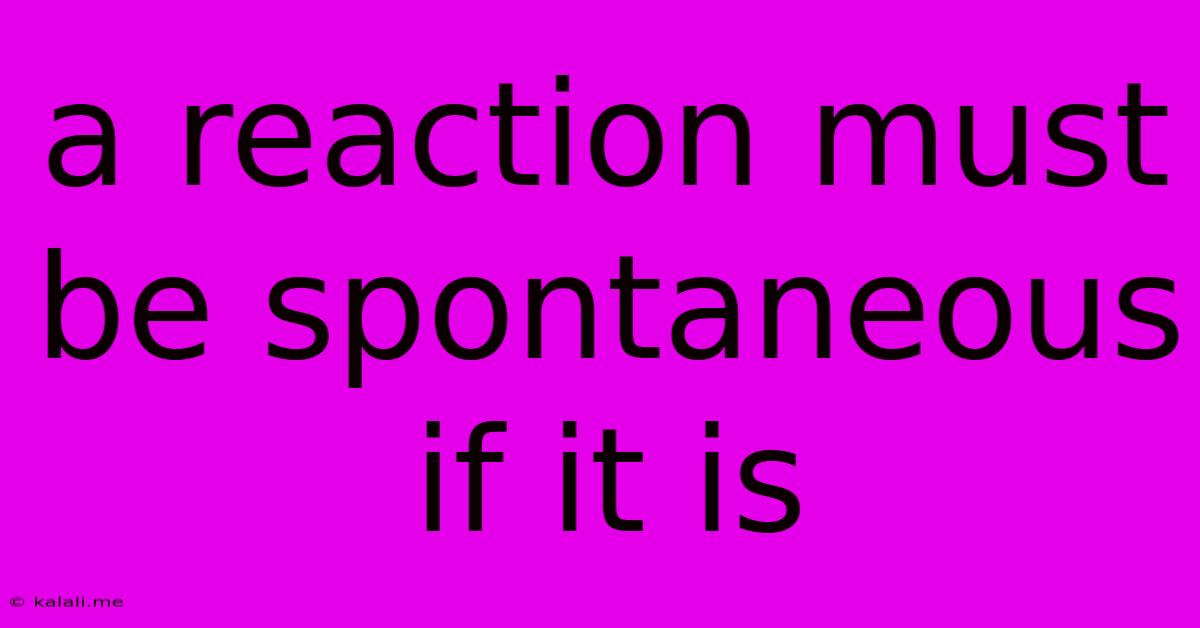A Reaction Must Be Spontaneous If It Is
Kalali
Jun 13, 2025 · 3 min read

Table of Contents
A Reaction Must Be Spontaneous If It Is… Thermodynamically Favorable!
A chemical reaction's spontaneity isn't about how fast it happens, but whether it will happen under a given set of conditions. This is determined by thermodynamics, specifically by changes in Gibbs Free Energy (ΔG). A reaction will be spontaneous if and only if it is thermodynamically favorable, meaning it leads to a decrease in Gibbs Free Energy. Let's delve into the specifics.
Understanding Gibbs Free Energy (ΔG)
Gibbs Free Energy (G) is a thermodynamic potential that measures the maximum reversible work that may be performed by a thermodynamic system at a constant temperature and pressure. The change in Gibbs Free Energy (ΔG) during a reaction indicates the spontaneity of that reaction. ΔG is calculated using the following equation:
ΔG = ΔH - TΔS
Where:
- ΔG is the change in Gibbs Free Energy (kJ/mol)
- ΔH is the change in enthalpy (kJ/mol) – essentially the heat absorbed or released during the reaction. Exothermic reactions (heat released, ΔH < 0) are favored.
- T is the temperature in Kelvin (K)
- ΔS is the change in entropy (kJ/mol·K) – a measure of disorder or randomness. Reactions that increase disorder (ΔS > 0) are favored.
Spontaneity and the Sign of ΔG
The sign of ΔG dictates the spontaneity of a reaction:
- ΔG < 0 (negative): The reaction is spontaneous under the given conditions. It will proceed in the forward direction without external intervention.
- ΔG > 0 (positive): The reaction is non-spontaneous under the given conditions. It will not proceed in the forward direction without external input (like adding energy). The reverse reaction, however, will be spontaneous.
- ΔG = 0 (zero): The reaction is at equilibrium. The forward and reverse reaction rates are equal.
Factors Affecting Spontaneity: Enthalpy and Entropy
Both enthalpy (ΔH) and entropy (ΔS) play crucial roles in determining spontaneity.
-
Enthalpy (ΔH): Exothermic reactions (ΔH < 0), which release heat, tend to be spontaneous because they are energetically favorable. The system moves to a lower energy state.
-
Entropy (ΔS): Reactions that increase the disorder or randomness of the system (ΔS > 0) are favored entropically. Think of a solid dissolving into a liquid – the particles become more dispersed, increasing entropy.
Temperature's Role
The temperature (T) acts as a weighting factor in the Gibbs Free Energy equation. At low temperatures, the enthalpy term (ΔH) dominates, while at high temperatures, the entropy term (TΔS) becomes more significant. This means that a reaction that is non-spontaneous at low temperatures might become spontaneous at high temperatures if the entropy increase is sufficiently large.
Examples:
-
Combustion of Methane: This is a highly exothermic reaction (ΔH < 0) and leads to an increase in entropy (ΔS > 0). Therefore, ΔG is significantly negative, making it highly spontaneous.
-
Melting of Ice: This is an endothermic reaction (ΔH > 0), but the increase in entropy (ΔS > 0) is substantial. At temperatures above 0°C, the TΔS term outweighs ΔH, resulting in a negative ΔG and spontaneous melting.
In Conclusion:
A reaction is spontaneous if and only if its Gibbs Free Energy change (ΔG) is negative. This spontaneity is a consequence of the interplay between enthalpy (ΔH) and entropy (ΔS) changes, modulated by temperature (T). Understanding these thermodynamic principles is crucial for predicting the direction and feasibility of chemical reactions.
Latest Posts
Latest Posts
-
First Psychological Laboratory Was Established By
Jun 14, 2025
-
A Deuterium Nucleus Contains Which Of The Following
Jun 14, 2025
-
The Clear Sky Appears Blue Because
Jun 14, 2025
-
Can I Change Sat Test Date
Jun 14, 2025
-
How Many Significant Figures Are In 500
Jun 14, 2025
Related Post
Thank you for visiting our website which covers about A Reaction Must Be Spontaneous If It Is . We hope the information provided has been useful to you. Feel free to contact us if you have any questions or need further assistance. See you next time and don't miss to bookmark.